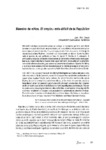Mostrar o rexistro simple do ítem
Maestro de niños: el empleo más difícil de la República
| dc.contributor.author | Ruiz Berrio, Julio | |
| dc.date.accessioned | 2011-07-12T11:36:09Z | |
| dc.date.available | 2011-07-12T11:36:09Z | |
| dc.date.issued | 2002 | |
| dc.identifier.citation | Sarmiento Anuario galego de historia da educación, 2002, 6: 97-111. ISSN: 1138-5863 | es_ES |
| dc.identifier.issn | 1138-5863 | |
| dc.identifier.uri | http://hdl.handle.net/2183/7767 | |
| dc.description.abstract | [Resumen] El objeto del presente artículo es subrayar la importancia que tenía para Martín Sarmiento, el papel del maestro en la educación, así como analizar las características y fun- ciones típicas de un buen maestro. En primer lugar, el autor hace una resumen del trabajo del maestro en el antiguo Régimen, para poder contrastar el punto de vista de Sarmiento, aficio- nado al ejercicio de esta profesión en lugar de discutir la filosofía de la educación. A continuación, recoge las principales observaciones del benedictino referente a los mismos pro- fesionales. El autor describe el maestro ideal según Sarmiento, de acuerdo con su empirismo nominalista sobre la educación y sus deseos de una reforma educativa en España. Por último, el autor expone el carácter antecesor de estas ideas en la Historia de la educación en España, haciendo hincapié en dos grandes educadores Pablo Montesino y Manuel Bartolomé Cossío, | es_ES |
| dc.description.abstract | [Abstract] The purpose of this work is to highlight the importance of school teachers in edu- cation according to Martin Sarmiento, as well as to analyse the characteristics and functions of a good school teacher. First, the author outlines the job of the school teacher in the Ancien Régime, in order to compare this point 01 view with that of Sarmiento, who promoted practising the profession rather than presenting arguments on the philosophy of education. Also presented are the principal observations of the Benedictine monk regarding these professionals. The aut- hor continues by discussing Sarmiento's notion of the ideal school teacher, in keeping with his nominalistic empiricism on education and his aspiration to achieve educational relorm in Spain. Finally, the author discusses the thinking leading up to these ideas in the History of Education in Spain, focussing on two great educators, Pablo Montesino and Manuel Bartolomé Cossío. | es_ES |
| dc.language.iso | spa | es_ES |
| dc.publisher | Universidade da Coruña | es_ES |
| dc.title | Maestro de niños: el empleo más difícil de la República | es_ES |
| dc.type | info:eu-repo/semantics/article | es_ES |
| dc.rights.access | info:eu-repo/semantics/openAccess |






